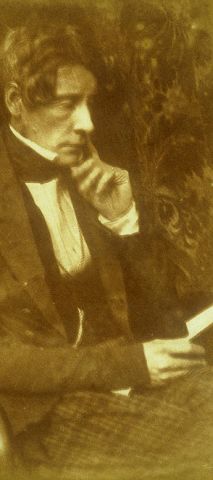 John Duncan (1796 – February 26, 1870) was no Rabbi; he was a Scottish pastor who did missions work among the Jews in Hungary. Luminaries like Adolph Saphir (author of The Hidden Life) and Alfred Edersheim (author of The Life and Times of Jesus the Messiah) were converted under his ministry. He was so involved with ministry to Jews, and so good with the Hebrew language (he taught “Oriental Languages” as Hebrew and its cognates were called back then at New College, Edinburgh for many years), that people started calling him “Rabbi.”
John Duncan (1796 – February 26, 1870) was no Rabbi; he was a Scottish pastor who did missions work among the Jews in Hungary. Luminaries like Adolph Saphir (author of The Hidden Life) and Alfred Edersheim (author of The Life and Times of Jesus the Messiah) were converted under his ministry. He was so involved with ministry to Jews, and so good with the Hebrew language (he taught “Oriental Languages” as Hebrew and its cognates were called back then at New College, Edinburgh for many years), that people started calling him “Rabbi.”
The best way to appreciate Duncan is in his sound bites, and the best collection of them is in a chapter of David Brown’s biography of Duncan. His biographer said of Duncan, “In the fixed language of books he was in shackles, but in the plastic language of oral speech, which he could modify and supplement at will, he moved freely.” Here are my favorites Duncan aphorisms.
On Thomas Carlyle: Sham is a word often in the mouth of one who is a keen detector of other people’s shams, and a very earnest maker of his own.”
On Wesley’s Hymns: “I have a great liking for many of Wesley’s Hymns; but when I read some of them, I ask, ‘What’s become of your Free-will now, friend?'”
On Genius: “Genius lies very much in that region where the profound is simple, and the simple profound. The great thoughts of such men as Chalmers are very simple when expressed; but only a man of genius could think them.”
On Mysteries: “All the great mysteries are simple as well as unfathomably deep; and they are common to all men. Every Christian feels them less or more.”
Hyper-Calvinism and Arminianism: “Hyper-Calvinism is all house and no door; Arminianism is all door and no house.”
Aesthetic Religion: “There is no entering into the kingdom of heaven by a mere sense of beauty.”
Terminology: “There is a curious connexion between the success of a teacher and his possession of a fine terminology –a good store of words to express shades of meaning. Much wisdom has been stored up in men, and never diffused for want of the gift of speech.”
Reason in God: “Transcendentally, it is true that God has reason, but He does not reason; He does not draw syllogisms.”
Love: “Individual love, per se, is a centrifugal force; universal, cosmopolitan love, per se, is centripetal: combine them, and the revolutions of love are orderly.”
How and What: “All questions as to the ‘How’ are best answered by a more extended knowledge of the ‘What.'”
Old and New Covenants: “We must not unsaint the Old Testament saints, but we must not make Pentecostal Christians of them.”
Trinity: “The Trinity is my highest Theologoumenon. I reach it, and find in it the supreme harmony of revealed things. But it is equally irrational and irreverent to speculate on the nexus between the distinct Persons. That is not revealed, and is not revealable.”
More on the Trinity: “I exceedingly dislike that expression of some divines, that Christ purchased for us the blessings of the Spirit. I cannot but believe that the three things –the Father’s love, the sacrifice of the Son, and the influence of the Spirit– are each and all the unpurchasable blessings of grace. And I am driven to this, to hold my ground against the Socinians.”
Fighting Theologians: “Now, every unrenewed Arminian is a Pelagian, and every unrenewed Calvinist is a fatalist.”
Old Brazey: “Hezekiah broke in pieces the brazen serpent that Moses had made, because the children of Israel had made an idol of it; and he called it ‘Nehushtan’ –literally ‘Old Brazey.’ … There was no harm in keeping the brazen serpent; bu when they began to turn it to idolatry, it was proper to break it in pieces. ‘What! will you break in pieces a relic connected with our history –a historic memorial?’ ‘Yes, I’ll break it in pieces,’ and he called it ‘Old Brazey.'””
On the communion of saints: “Does no news go between earth and heaven? and if news goes, must there not be knowledge of events? God has put there a veil; Popery tries to bring us within it, and Protestants will not look at it for Papistical abuse.”